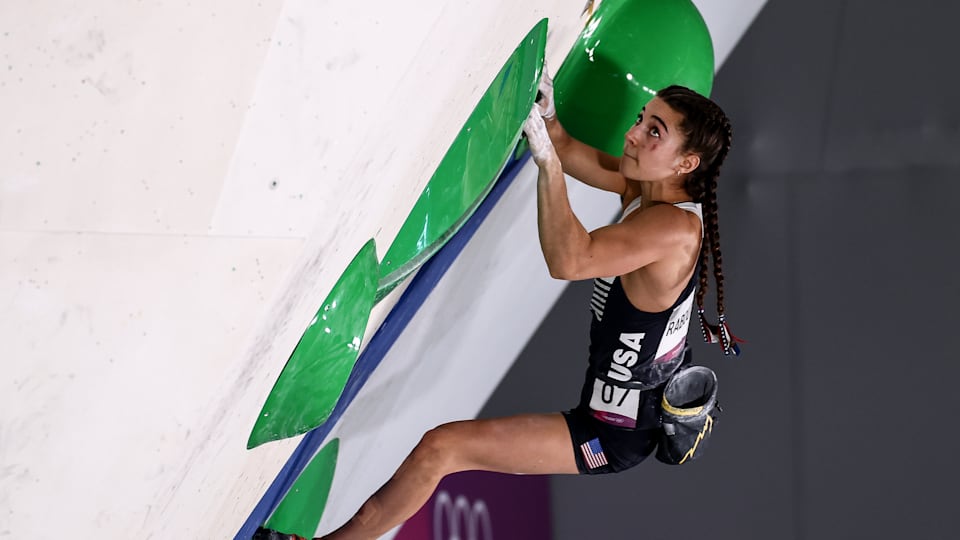Brooke Raboutou exclusive: Why climbing is about self-growth
The 2023 World Bronze medallist shares how her studies in Psychology and Marketing help her in her unique approach of the sport.

Climbing is in Brooke Raboutou’s blood. She’s the daughter of two competitive climbers, Didier Raboutou and Robyn Erbesfield-Raboutou, and she was part of the first U.S. Olympic team in sport climbing.
But it’s also in her blood because of how climbing so quickly became her own thing, and now calls herself addicted to it.
“Climbing is really addictive. I think it's that kind of self-growth and also the direct feedback that it gives you, you fall and you're like, Wow, I can get higher. You know you can do one more move. You're like, I can keep going,” Raboutou said Olympics.com. “And there's that addictiveness of how you can always keep going. You can always do more. Try harder, climb higher, be better, learn more technique. There's just so much to learn and it's ever evolving."
Raboutou: Sport climbing is in her DNA
Raboutou said climbing was always offered by her parents, but not forced.
“When I think back to when I was a little kid climbing, like two years old in diapers and stuff, it's pretty crazy to think where I've come from, and the whole journey. But most of all, I'm just really grateful for my parents and their pure love for the sport that brought me and my brother into it,” Raboutou said. “And they never pushed us to do it, but really just inspired and showed us what the sport can do and how just how much love they have for it really brought us into our own love for it.”
Raboutou’s passion for climbing carried her to the Tokyo Olympics. She finished fifth, ending up just off the podium. That experience, while disappointing in the moment, ended up being a way for her to learn.
Raboutou on Olympic experience
“I learned a lot from the Olympics. Most of all, the journey. That was the first time that I really dedicated a lot of my time to training, being a full-time, elite athlete and just seeing what I could do on the big stage was really eye opening and then taking that into the past few seasons has been just really, I don't know, exciting. Fifth was definitely a bittersweet position. It left me wanting more and knowing how much more I could do, which has just continued to push me.”
At the 2023 IFSC world championships in Bern, she won bronze in bouldering, took fifth in lead and fourth in boulder and lead. She’s also placed in the top three in several World Cup events since Tokyo. Raboutou’s father is from France, and her growth in the sport plus her connection to the host country means 2024 can be an opportunity for Raboutou to shine.
“The 2020 Olympics was really special because of COVID. We didn't get to have any family there. There were a lot of restrictions, so I would be pretty spectacular to get to compete in the Olympics and have all of my family there, especially in France, where I have a lot of family,” Raboutou said.
“I used to go to France every summer for about three months, every year. My whole dad's side of the family lives there and only speaks French, so I've spent a lot of time there. It means a lot to me.”
Raboutou recently graduated from the University of San Diego, where she studied psychology and marketing. She’s found she can use what she learned in climbing.
“My learning through school has brought a lot to climbing especially in marketing, in psychology, learning a lot how the brain works and how we work as people and just understand new circumstances,” she said. “Applying that to competition and just to myself of how to deal with pressures, how to deal with new things and. Just continuously learning what works for me and what doesn't, I think is really helpful, both in school and then applying that to climbing as well and vice versa.”
While climbing is what she is focusing on now, she is intrigued at the idea of combing her love for sports and her psychology training. Since she’s been at the highest levels of competition, and can understand what athletes are dealing with in maintaining their mental health.
“One of the biggest parts that is often overlooked is the mental component. It's essentially everything. When it comes down to it, a lot of us have, you know, similar strengths and physical abilities. But if you're not able to apply it and deal with all of that stress and outside pressures, then it doesn't really matter what you're physically capable of. Same kind of goes with life. So you can learn how to go through those ups and downs and learn what tools work for you and what doesn't. But really relying on yourself in those moments is really important.”
